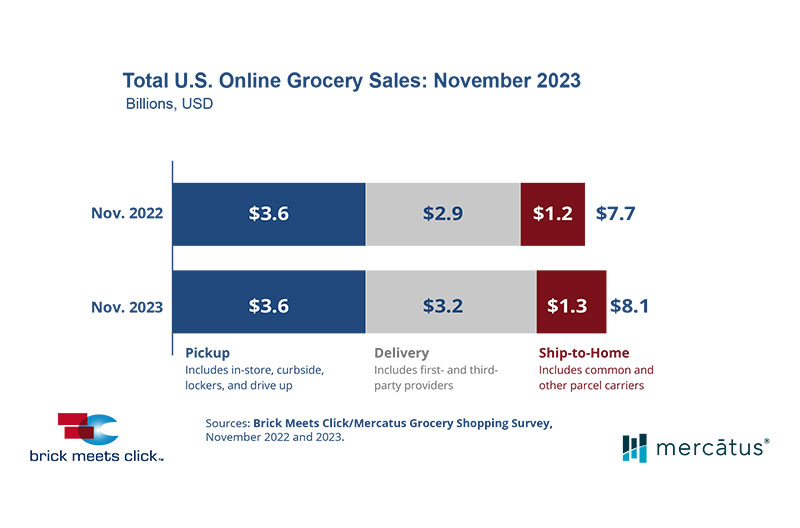The U.S. online grocery market posted $8.1 billion in total monthly sales for November, up 5.2 percent compared to last year’s $7.7 billion, according to the monthly Brick Meets Click/Mercatus Grocery shopping survey.
While all three receiving methods contributed to the year-over-year sales growth, delivery reported the largest gain driven by a significant jump in its monthly users versus the prior year.
Also during November, mass retailers surpassed supermarkets to become the primary retail format that most households relied on for their grocery purchases during the month, whether online or in-store.
The headwinds that supermarkets face in their online business parallel many of the competitive forces also challenging their overall operations.
For November, the research showed that 42 percent of U.S. households used a mass retailer for most of their in-store or online grocery purchases during the month, finishing 390 basis points higher than supermarkets for the same period. This is a reversal since May, when 42 percent of households reported using supermarkets as their primary store compared to 39 percent for mass.
“The current economic realities and omnichannel strategies are aiding mass retailers in attracting more customers today,” said David Bishop, partner at Brick Meets Click.
“The price advantage that a mass rival, such as Walmart, enjoys is motivating cash-strapped households to shift where they shop, and mass customer engagement strategies are making it easier for those customers to shop the way they want.”
The latest research also documented that households that shopped for groceries primarily at Walmart during November were also more likely to shop online for groceries – and to do so at Walmart.com – compared to households who shopped primarily at a supermarket.
The continued elevated levels of cross-shopping between mass and grocery (combined supermarkets plus hard discount) highlight the challenges facing both customers and retailers.
In November, the percentage of households that bought groceries online from grocery and mass during the month rose 300 basis points compared to last year, resulting in 33 percent of grocery’s MAU base also shopping for groceries online with a mass shopping service.
While the composite repeat intent rate for pickup and delivery in November improved 140 bps versus 2022 to 63.6 percent, mass recorded its largest advantage over grocery as rates diverged between the two formats. Mass ended with a nearly 19-point lead over grocery in November as its repeat intent rate improved by 630 bps while grocery’s declined by 690 bps.
“Considering the challenges regional grocers face today in acquiring and retaining customers, it’s worth recalling the phrase, ‘A bird in the hand is worth two in the bush,'” said Sylvain Perrier, president and CEO, Mercatus.
“This adage underscores the importance of paying closer attention to current customers’ expectations for online services and then delivering the kind of experience they want. While easier said than done, it requires a clear strategy and plan to execute.”
Online sales across all formats accounted for 11.7 percent of total weekly grocery spending during the last week of November, increasing 160 bps versus last year. The combined contribution of pickup and delivery, since most conventional supermarkets don’t offer ship-to-home, also grew 130 bps to finish the month at 9.8 percent.
About the research
The Brick Meets Click/Mercatus Grocery Shopping Survey is an ongoing independent research initiative created and conducted by Brick Meets Click and sponsored by Mercatus.
Brick Meets Click conducted the survey on Nov. 29-30 with 1,814 adults, 18 or older, who participated in the household’s grocery shopping.
Read more technology news from The Shelby Report.

